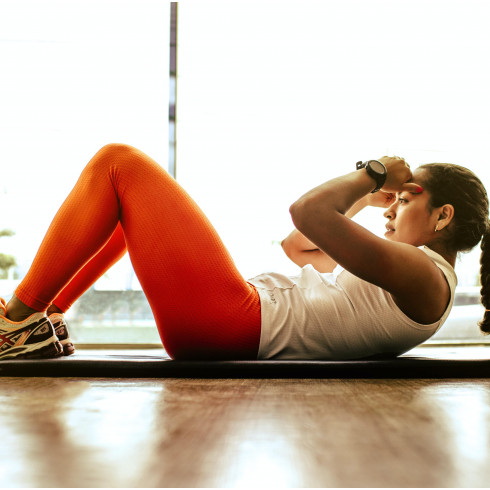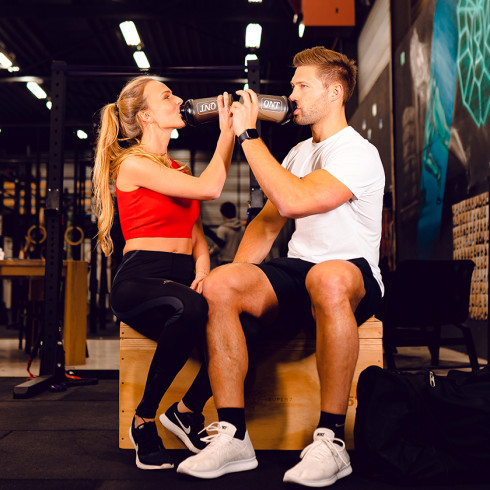The influence of alcohol on strength training
TABLE OF CONTENTS
- Does alcohol affect muscle gain?
- Does alcohol impact performance in bodybuilding?
- How long after drinking alcohol can you train?
- Does alcohol slow down muscle recovery?
- Does alcohol affect fat loss?
- Is it possible to drink alcohol and stay in shape?
- How much alcohol can you drink without hindering your bodybuilding goals?
- How does alcohol influence testosterone production?
- Does drinking after training affect recovery?
- Coach's advice
DOES ALCOHOL AFFECT MUSCLE GAIN?
When you're looking to build muscle mass, every habit counts. Alcohol consumption, even in moderation, can impact your muscle gains and recovery process.
- Reduction of muscle protein synthesis: Alcohol can inhibit the body's ability to synthesize proteins, a crucial process for muscle growth. Less protein synthesis means muscles repair and grow less efficiently after training.
- Lowering testosterone levels: Testosterone is a key hormone for muscle growth. Alcohol, especially when consumed in large amounts, can reduce testosterone levels, making it harder to build muscle.
- Increase in cortisol levels: Alcohol can also raise cortisol levels, a stress hormone. Cortisol is catabolic, meaning it promotes muscle tissue breakdown and interferes with building new muscle.
- Compromised recovery: Alcohol can impair sleep quality and slow recovery, both key elements for muscle growth. Poor sleep prevents muscles from recovering properly after exertion, reducing potential gains.
- Dehydration and lack of nutrients: Alcohol is a diuretic, which can lead to dehydration. Muscles need to be well-hydrated to function and grow properly. Additionally, alcohol can interfere with the absorption of essential nutrients for muscle gain, such as vitamins and minerals.
In summary, if you're aiming to build muscle, it's best to limit your alcohol consumption, or at least moderate it. Small occasional amounts may not have a major impact, but excessive or regular consumption can seriously hinder your progress.
DOES ALCOHOL IMPACT PERFORMANCE IN WEIGHTLIFTING?
Yes, alcohol can negatively impact your performance in bodybuilding, mainly through several mechanisms that affect energy, strength, and focus. Here's how:
1. Reduced coordination and focus: Alcohol affects the central nervous system, leading to decreased coordination, focus, and reaction time. In bodybuilding, where it's crucial to control movements and stay focused, this can result in less effective performance and even increase the risk of injury.
2. Decreased energy reserves: Alcohol interferes with the use of carbohydrates as an energy source. This means that glycogen stores in the muscles, essential for intense bodybuilding efforts, are reduced, leading to quicker fatigue and less strength during workouts.
3. Impact on hydration and electrolytes: Alcohol is a diuretic, which means it promotes fluid and electrolyte loss. Dehydration can lower your strength and endurance, making your workouts less effective and more exhausting.
4. Sleep and recovery disruption: Good sleep is essential for peak performance in bodybuilding, as it allows muscles to repair and strengthen. Alcohol disrupts sleep cycles, reducing the quality of your rest and, therefore, your ability to fully recover for future workouts.
If you want to optimize your bodybuilding performance, it's important to monitor your alcohol consumption. Even moderate amounts can lead to performance drops, reduce your strength, and prevent you from giving your best during training.
HOW LONG AFTER DRINKING ALCOHOL CAN YOU TRAIN?
After consuming alcohol, it is recommended to wait before resuming training to avoid compromising your performance and recovery. Here are a few factors to consider when determining how long to wait:
1. Alcohol metabolism: On average, the body takes about one hour to metabolize each standard drink of alcohol. However, this can vary depending on body weight, gender, food intake, and the amount of alcohol consumed. Waiting at least 12 to 24 hours after moderate consumption is often advised to ensure the alcohol is fully eliminated from your system.
2. Impact on hydration: Since alcohol is a diuretic, it increases the elimination of fluids through urine, which can lead to dehydration. Proper hydration is crucial for optimal performance in weight training. It’s important to rehydrate your body before returning to training by consuming water and electrolytes to restore balance.
3. Effect on physical performance: Training the body after consuming alcohol can result in decreased strength, endurance, and coordination. Waiting until you feel fully recovered and energized is essential to avoid suboptimal performance and minimize the risk of injury.
4. Sleep quality: If you consumed alcohol at night, it’s possible that the quality of your sleep was affected. Sleep is fundamental for muscle recovery and mental preparation for training. Waiting at least a day allows you to regain a good night’s rest and maximize your performance.
To train safely and under optimal conditions after consuming alcohol, it is recommended to wait 12 to 24 hours, ensuring proper hydration and sufficient recovery. This ensures that your body is ready to handle physical exertion without the risk of injury or underperformance.
DOES ALCOHOL SLOW DOWN MUSCLE RECOVERY?
Yes, alcohol can slow down muscle recovery after training. Here are several ways in which alcohol can hinder this essential process for muscle growth and repair:
- Interference with protein synthesis: Muscle recovery largely depends on protein synthesis, a process in which the body repairs and strengthens the muscle fibers damaged during training. Alcohol can reduce this process, meaning that muscles repair less efficiently, and your muscle gains may be slowed down.
- Negative impact on hormone levels: Alcohol consumption can lower testosterone levels, a key hormone in muscle recovery and building, while increasing cortisol, the stress hormone. Excess cortisol can cause muscle tissue breakdown, further delaying recovery.
- Sleep disruption: Sleep is one of the most important times for muscle recovery, as this is when your body works to repair damaged muscles and restore energy. Alcohol disrupts sleep cycles, particularly by reducing deep sleep, which diminishes the quality of rest and delays muscle regeneration.
- Dehydration: Since alcohol is a diuretic, it can lead to dehydration, which hampers the circulation of essential nutrients for muscle repair. A lack of water in the body reduces the muscles’ ability to receive the nutrients and oxygen needed for fast and efficient recovery.
- Reduced ability to absorb nutrients: In addition to affecting hydration, alcohol can also interfere with the absorption of nutrients such as amino acids, vitamins, and minerals, all of which are crucial for muscle repair and recovery after exercise.
Conclusion: Consuming alcohol after a weightlifting session can indeed slow down the recovery process by inhibiting protein synthesis, disrupting hormonal cycles, and reducing sleep quality. To maximize muscle recovery, it is recommended to limit alcohol consumption, especially after training, and to prioritize restorative sleep, proper hydration, and nutrient-rich nutrition.
DOES ALCOHOL AFFECT FAT LOSS?
Yes, alcohol can have a significant impact on fat loss and make this goal more difficult to achieve. Here’s why:
1. Empty calories: Alcohol is high in calories, with around 7 calories per gram, which places it just behind fats (9 calories per gram). These calories are considered "empty" because they provide no essential nutrients. When you consume alcohol, these additional calories can easily exceed your energy needs, making it harder to create the calorie deficit necessary for fat loss.
2. Metabolic priority: When you consume alcohol, your body treats it as a toxin and prioritizes metabolizing it. This means that while your body is breaking down alcohol, fat burning, along with the burning of carbohydrates and proteins, slows down. Therefore, alcohol inhibits your body’s ability to use fat as an energy source.
3. Increased appetite: Alcohol can disrupt appetite regulation by increasing food cravings, particularly for high-fat or sugary foods. This can lead to overeating, which compromises fat loss efforts.
4. Impact on hormones: Alcohol can disrupt hormonal balance, particularly by lowering testosterone levels and increasing cortisol levels. This hormonal imbalance can make fat loss more challenging and promote fat storage, especially around the abdomen.
5. Sleep disruption: Poor sleep quality caused by alcohol consumption can also hinder fat loss. Insufficient sleep disrupts hunger hormones such as leptin and ghrelin, increasing cravings and making it harder to manage your diet.
6. Decreased motivation to train: Excessive alcohol consumption can reduce the energy and motivation needed to train regularly and intensely, which is essential for burning calories and supporting fat loss.
Alcohol can therefore hinder your fat loss goals by adding empty calories, slowing fat burning, and increasing appetite. To maximize your fat loss efforts, it is recommended to limit alcohol consumption, prioritize a balanced diet, and stick to a regular training routine.
IS IT POSSIBLE TO DRINK ALCOHOL AND STAY IN SHAPE?
Yes, it is possible to drink alcohol while staying in shape, as long as it is done in moderation and with a few precautions. Here’s how alcohol can be incorporated into a healthy lifestyle without compromising your fitness goals:
1- Moderation above all: The key to staying fit while consuming alcohol is moderation. Drinking occasionally, in reasonable amounts (for example, one or two drinks from time to time), should not have a major impact on your fitness goals. However, excessive or frequent consumption can lead to negative effects on body composition and performance.
2. Managing calories: Alcohol provides extra calories, which can easily add up if you’re not careful. By controlling your portions and choosing lower-calorie options, like wine or spirits without added sugars, you can limit the impact on your overall calorie intake. For instance, replacing sugary cocktails with a simple glass of wine or a drink with a zero-calorie mixer can help avoid excess calories.
Yes, drinking alcohol after a workout can hinder recovery, a crucial process for maximizing muscle gains and restoring energy levels. Here are several ways alcohol can disrupt this essential process:
1. Inhibition of muscle protein synthesis: After training, the body enters a recovery phase where it repairs damaged muscle fibers by synthesizing new proteins. Alcohol can inhibit this process by reducing the body’s ability to recover properly.
2. Maintaining a balanced diet: To stay fit while consuming alcohol, it is important to maintain a nutrient-rich diet to compensate for the “empty calories” provided by alcohol. It’s also crucial to ensure that you continue to consume enough protein, vitamins, and minerals to support your goals in body composition and performance.
3. Hydration and recovery: Since alcohol is a diuretic, it is important to stay well-hydrated to minimize the effects of dehydration, which can hinder your workouts and recovery. Drinking water between alcoholic beverages and ensuring you’re well-hydrated after a night out helps maintain performance levels.
4. Quality sleep: While alcohol can affect sleep quality, it is possible to mitigate these effects by consuming alcohol several hours before bed and making sure it’s not a regular habit. Good sleep is essential for recovery and physical performance, so it’s important to manage alcohol consumption to avoid disturbing this key factor of fitness.
5. Balance between enjoyment and discipline: Maintaining an active and healthy lifestyle while drinking alcohol is a matter of balance. It’s important to find a middle ground between the occasional enjoyment of drinking and the discipline needed to stay fit, whether through training or a balanced diet. Yes, it is entirely possible to drink alcohol and stay in shape, as long as it is done responsibly and in moderation. By monitoring your calorie intake, staying hydrated, maintaining a balanced diet, and getting enough rest, you can enjoy a drink occasionally while keeping up with your fitness goals.
HOW MUCH ALCOHOL CAN YOU DRINK WITHOUT HARMING YOUR BODYBUILDING GOALS?
6. Drinking alcohol while pursuing bodybuilding goals is possible, but the amount should be moderate to avoid affecting your performance and gains. Here are a few points to consider when determining how much alcohol you can consume without harming your goals:
- Moderate consumption: Moderation is key. For most people, having one or two drinks occasionally (for example, once or twice a week) will not have a significant impact on muscle building or recovery. However, excessive and regular consumption can compromise your long-term efforts.
- Avoiding excess: Excessive alcohol consumption, defined as more than 3 to 4 drinks per day, can inhibit muscle protein synthesis, reduce testosterone levels, and increase cortisol, the stress hormone, which promotes muscle breakdown. Large amounts of alcohol can also interfere with training quality and slow down recovery.
- Calorie control: Alcohol contains many empty calories that can easily add to your daily caloric intake. To avoid exceeding your calorie needs and gaining unwanted weight, it’s important to monitor your portions. Limiting consumption to 1 or 2 drinks on special occasions can help manage these extra calories more effectively.
- Choosing lower-calorie drinks: Opting for lower-calorie drinks, such as a glass of wine or spirits mixed with sugar-free beverages, can reduce the caloric impact of your consumption. Avoiding sugary cocktails or high-calorie beers is a good strategy to minimize the effect on your body composition.
- Spacing out consumption: To minimize the negative effects of alcohol on recovery and performance, it’s recommended not to drink right before or after an intense workout. Allowing several hours, or even a day, between alcohol consumption and your weight training sessions gives your body time to rehydrate and recover fully.
- Hydration and sleep:Drinking alcohol can disrupt sleep and recovery. If you choose to drink alcohol, make sure you stay hydrated and get enough sleep to avoid compromising your muscle gains and training efficiency. In general, having one or two drinks occasionally shouldn’t affect your bodybuilding goals. The important thing is to maintain moderation, avoid excess, monitor caloric intake, and ensure that hydration and sleep are not neglected. Keeping a good balance between enjoyment and discipline is essential to continue progressing in bodybuilding while enjoying moments of relaxation.
HOW DOES ALCOHOL INFLUENCE TESTOSTERONE PRODUCTION?
Alcohol can have a negative impact on testosterone production, an essential hormone for muscle growth, recovery, and physical performance. Here’s how alcohol influences this key hormone:
- Direct reduction in testosterone levels: Excessive alcohol consumption, especially on a regular basis, can reduce testosterone levels in the body. Alcohol interferes with the function of the testes (in men), which are responsible for producing testosterone. This can lead to lower hormone levels, affecting the body’s ability to build muscle, burn fat, and recover after training.
- Effect on liver enzymes: Alcohol is primarily metabolized in the liver, and its consumption can interfere with the enzymes responsible for synthesizing steroid hormones, including testosterone. High and prolonged consumption can lead to liver damage, which directly impacts hormone production and, consequently, testosterone levels.
- Increase in cortisol levels: Alcohol promotes the production of cortisol, the stress hormone, which is the opposite of testosterone. When cortisol levels rise, they can inhibit testosterone production, negatively affecting muscle growth and recovery.
- Impact on sleep: Another indirect effect of alcohol on testosterone is through sleep disruption. A good night’s sleep is essential for maintaining optimal testosterone levels, as the body regulates its hormones during sleep. Alcohol disrupts sleep cycles, especially deep sleep, leading to a reduction in testosterone production.
- Effect on gonadotropin production: Alcohol can also alter the production of gonadotropins, the hormones responsible for regulating the testes and testosterone production. Fewer gonadotropins mean reduced stimulation of the testes, which can lower testosterone production. Alcohol, especially when consumed in large quantities and regularly, can reduce testosterone levels both directly and indirectly, impacting muscle growth, recovery, and overall performance. To maintain optimal hormone levels and continue progressing in bodybuilding, it is recommended to limit alcohol consumption and prioritize a balanced and healthy lifestyle.
DOES DRINKING AFTER TRAINING HINDER RECOVERY?
7. Muscles use the necessary proteins for their repair, slowing down recovery and compromising muscle gains.
8. Decreased rehydration: Alcohol acts as a diuretic, meaning it increases water excretion through urine. After a workout, when the body has already lost a lot of fluid through sweat, proper rehydration is essential. Drinking alcohol after exercise worsens dehydration, which can slow muscle recovery and affect future performance.
9. Impact on glycogen replenishment: Intense training depletes glycogen stores in the muscles, a key energy source. After exercise, the body needs carbohydrates to replenish these stores. Alcohol can delay this process by interfering with carbohydrate metabolism, slowing glycogen replenishment and extending the time needed for recovery.
10. Increase in cortisol levels: Drinking alcohol after a workout can also increase cortisol levels, the stress hormone. Cortisol is catabolic, meaning it promotes the breakdown of muscle tissue, counteracting the efforts made during training to build muscle.
11. Sleep disruption: Sleep plays a crucial role in recovery, as it is during this time that the body repairs muscles and regulates hormones. Alcohol can disrupt sleep cycles, particularly by reducing deep sleep, which compromises the quality of recovery and reduces the benefits of intense training.
12. Impairment of motor function and reaction time: Although this doesn’t directly affect muscle recovery, drinking alcohol after a workout can decrease coordination and motor function, increasing the risk of injury during future training sessions or physical activities.
Drinking alcohol after a workout can indeed hinder recovery by inhibiting protein synthesis, delaying rehydration, and disrupting sleep. To maximize recovery and optimize muscle gains, it’s best to avoid alcohol after training, or at least limit its consumption, while ensuring proper hydration and maintaining a diet rich in essential nutrients.
COACH'S TIPS

- As a dedicated athlete striving to improve, alcohol brings no benefits. Social pressure can be strong, and it’s sometimes hard to say no without feeling left out. But remember, as an athlete, you are already different. The real question is: "Do you feel good about that difference?"
- Since alcohol contributes nothing to your goals, there’s no reason to consume it just to conform to social expectations. If your goal is to progress and push your limits, alcohol is not part of that equation.
- If, for you, sports are primarily a way to socialize, the famous "third half" can be an opportunity for that. It’s up to you to decide what you really want and to be mindful of your alcohol consumption.
- In the end, it all comes down to what you want to achieve and fully owning the consequences of your choices.
Related posts
-
 Summer holidays: How to limit the damage?
Posted in: Our tips24/06/2021On holiday, we often tend to let ourselves go. Unless you're a hardcore sportsman, you tend to abandon your trainers...Read more
Summer holidays: How to limit the damage?
Posted in: Our tips24/06/2021On holiday, we often tend to let ourselves go. Unless you're a hardcore sportsman, you tend to abandon your trainers...Read more -
 Which fat burner to choose?
Posted in: Our tips26/05/2021To lose weight and burn fat, there is no secret: you have to do sport and take care of your diet. However, it is...Read more
Which fat burner to choose?
Posted in: Our tips26/05/2021To lose weight and burn fat, there is no secret: you have to do sport and take care of your diet. However, it is...Read more -
 Summer body edition for men: How to prepare your body?
Posted in: Our tips11/05/2021Gentlemen ? The return of the sun and its warm rays are almost here! The degrees are slowly but surely rising, but...Read more
Summer body edition for men: How to prepare your body?
Posted in: Our tips11/05/2021Gentlemen ? The return of the sun and its warm rays are almost here! The degrees are slowly but surely rising, but...Read more -
 9 good reasons to do sport.
Posted in: Our tips22/04/2021Sometimes the urge to exercise is not always there. And although we always tell ourselves that this year will finally...Read more
9 good reasons to do sport.
Posted in: Our tips22/04/2021Sometimes the urge to exercise is not always there. And although we always tell ourselves that this year will finally...Read more -
 Discover how to take care of your faithful companion: your shaker!
Posted in: Our tips07/04/2021In your bag, in your hand, in your sink, it is everywhere! The shaker is an essential element of any good training....Read more
Discover how to take care of your faithful companion: your shaker!
Posted in: Our tips07/04/2021In your bag, in your hand, in your sink, it is everywhere! The shaker is an essential element of any good training....Read more
Blog categories
Popular posts
-
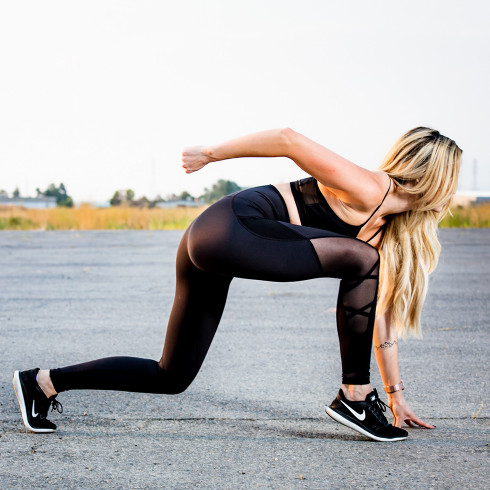 Looking thinner but at a heavier weight? Is that possible?04/10/2021Posted in: Our tipsAdvertising has shaped our thinking! We have been forced for years to believe that losing weight is the key to having...Read more
Looking thinner but at a heavier weight? Is that possible?04/10/2021Posted in: Our tipsAdvertising has shaped our thinking! We have been forced for years to believe that losing weight is the key to having...Read more -
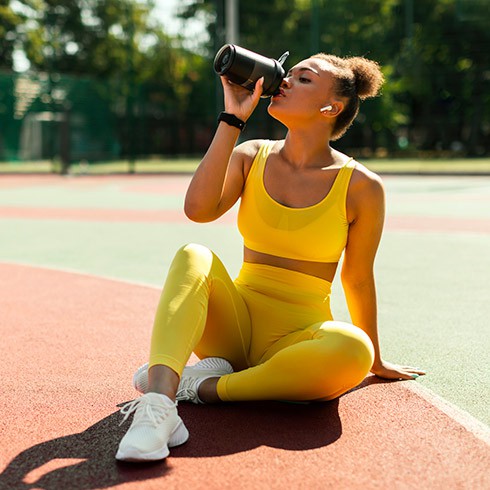 Proteins for weight loss !29/12/2023Posted in: Our tipsDive into the fascinating world of proteins and their key role in weight loss. Discover how to choose the best...Read more
Proteins for weight loss !29/12/2023Posted in: Our tipsDive into the fascinating world of proteins and their key role in weight loss. Discover how to choose the best...Read more -
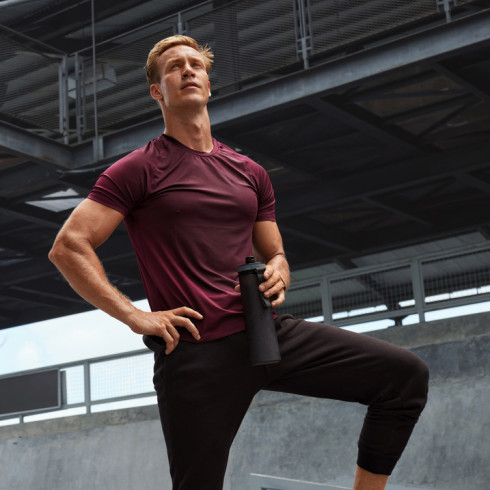 Which foods boost testosterone levels ?07/05/2021Posted in: Food supplementsTestosterone, often associated with virility, has much more to offer than you might think. It plays a crucial role in...Read more
Which foods boost testosterone levels ?07/05/2021Posted in: Food supplementsTestosterone, often associated with virility, has much more to offer than you might think. It plays a crucial role in...Read more -
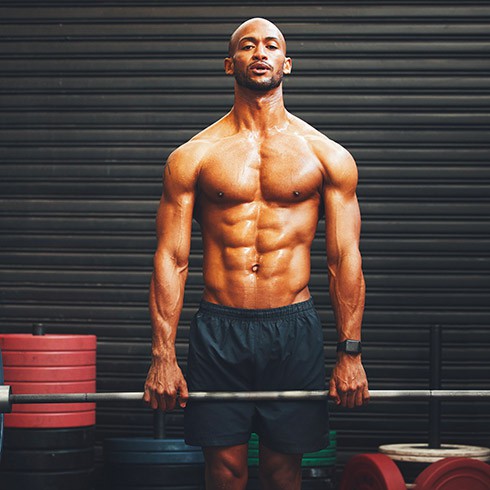 10 BENEFITS OF GLUTAMINE.02/01/2024Posted in: Our tipsDiscover the power of L-glutamine, an underrated superhero in the world of amino acids! Essential for revitalizing...Read more
10 BENEFITS OF GLUTAMINE.02/01/2024Posted in: Our tipsDiscover the power of L-glutamine, an underrated superhero in the world of amino acids! Essential for revitalizing...Read more -
 Is there a link between sex and sport?14/11/2019Posted in: LifestyleMany have already asked questions about sex and sport. Most of the time, people want to be reassured by the many...Read more
Is there a link between sex and sport?14/11/2019Posted in: LifestyleMany have already asked questions about sex and sport. Most of the time, people want to be reassured by the many...Read more

.jpg)
